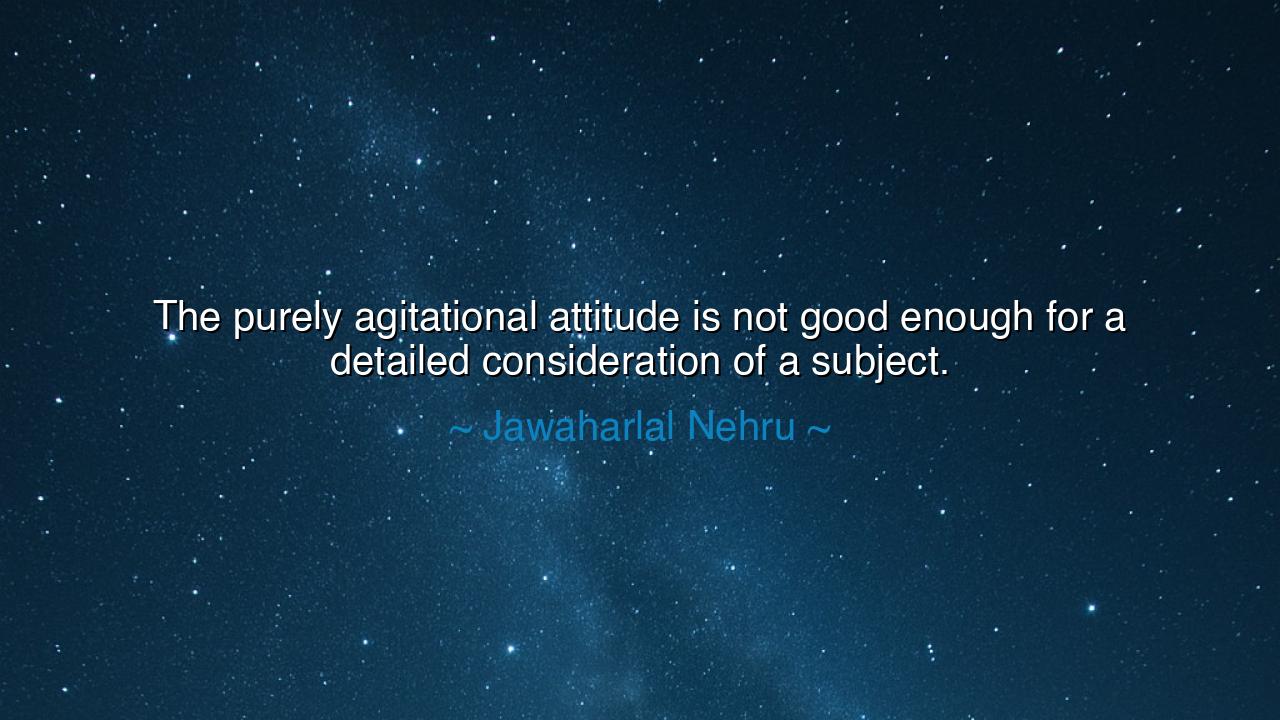
The purely agitational attitude is not good enough for a detailed
The purely agitational attitude is not good enough for a detailed consideration of a subject.






The soft murmur of the café filled the space, blending with the steady rhythm of rain against the window. Jack sat across from Jeeny, his coffee cup cradled in his hands, his gaze drifting toward the rain-soaked streets outside. Jeeny, sitting opposite him, seemed lost in thought, her fingers tracing the rim of her cup.
Host: After a brief moment of silence, Jeeny spoke, her voice contemplative, but with a touch of curiosity.
Jeeny: “I came across a quote from Jawaharlal Nehru today that made me reflect on how we approach complex issues. He said, ‘The purely agitational attitude is not good enough for a detailed consideration of a subject.’ What do you think about that? Do you think that sometimes our approach to problems is too driven by emotion or agitation, rather than deeper understanding?”
Jack: He looked up, his expression thoughtful. “I think Nehru is pointing out that surface-level reactions and quick judgments aren’t enough to truly engage with complex issues. When we’re agitated or just reacting to the latest event, we can miss the nuances and deeper layers that require real attention. It’s easy to get caught up in the heat of the moment, but true understanding comes when we step back and give a subject the time and depth it deserves. Agitation might fuel the immediate response, but it doesn’t lead to the kind of reflection needed to actually solve problems.”
Jeeny: “Exactly. There’s a danger in rushing to conclusions based on emotions or sensationalism. When we’re caught in that kind of agitation, we often don’t take the time to think critically or to look at the issue from multiple angles. Nehru’s quote reminds us that real progress requires a calm, reasoned approach, one that doesn’t simply react, but examines the root causes and the broader context.”
Host: The rain outside had softened, leaving a quiet stillness in the café. Jack shifted slightly, his fingers still resting on his coffee cup as he continued.
Jack: “And that’s something that’s easy to forget in the world we live in today, where things are often driven by emotion and impulse—especially with the speed of information and social media. Agitation can create the illusion that we’re making progress or getting to the heart of a problem, but in reality, it just keeps us spinning in circles. We need to be able to step away from the noise and give issues the consideration they deserve, without jumping to conclusions.”
Jeeny: “Yes, and I think it’s important to recognize that true change doesn’t come from quick, agitated reactions—it comes from thoughtful, deliberate action. When we truly take the time to understand something, we can find more effective solutions that address the root causes, not just the symptoms. The agitation is often just a distraction from what’s really important.”
Host: The conversation between them seemed to deepen, as they both reflected on the importance of thoughtful reflection. Jack set his coffee cup down gently, his expression softening.
Jack: “It’s a reminder that we need to slow down sometimes. When we’re quick to react, we can miss the big picture. Agitation might give us a sense of urgency, but it’s understanding that leads to real action. We have to be willing to engage with a subject deeply, to ask questions and explore the complexities, rather than just reacting to what’s happening on the surface.”
Jeeny: Her smile was small but filled with understanding. “Exactly. True progress comes from the patience to see the whole picture, not just the parts that immediately grab our attention. Nehru’s words remind us that the only way to truly move forward is through calm, thoughtful reflection.”
Host: The rain had stopped, and the atmosphere in the café seemed to settle into a quiet calm. Jack and Jeeny sat in the realization that real change doesn’t come from agitation, but from thoughtful, detailed consideration. Nehru’s words serve as a reminder that deep understanding and progress require patience, reflection, and the willingness to engage with complex issues in a way that goes beyond surface-level reactions.






AAdministratorAdministrator
Welcome, honored guests. Please leave a comment, we will respond soon